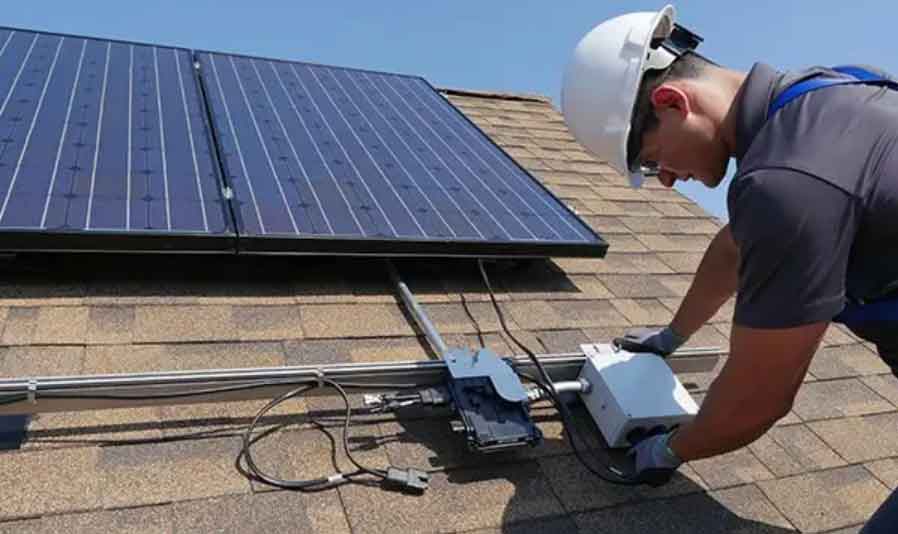The efficiency and output of solar panels are critical factors in the effectiveness of solar energy systems. The introduction of micro inverters has significantly improved these metrics by optimizing the performance of individual solar panels. This article explores the impact of micro inverters on solar panel efficiency and output, detailing how they enhance overall system performance, comparing them with traditional string inverters, and providing insights into their benefits and applications.

Understanding Micro Inverters
Micro inverters are small, independent devices installed on each solar panel. They convert the direct current (DC) generated by the solar panels into alternating current (AC) that can be used by home appliances and fed into the electrical grid. Unlike traditional string inverters, which handle the output of multiple panels collectively, micro inverters operate on a per-panel basis, offering several distinct advantages.
Table 1: Comparison of Micro Inverters and String Inverters
| Feature | Micro Inverter | String Inverter |
|---|---|---|
| Operation | Per-panel basis | Collectively for multiple panels |
| Efficiency | Higher, independent optimization | Lower, limited by the weakest panel |
| Monitoring | Panel-level monitoring and diagnostics | System-level monitoring only |
| Reliability | Increased system reliability | Dependent on a single inverter |
| Installation | More complex, requires individual connections | Simpler, fewer connections required |
| Cost | Higher initial cost | Lower initial cost |
Impact on Solar Panel Efficiency
Micro inverters significantly enhance the efficiency of solar panels by allowing each panel to operate independently. This independent operation ensures that issues affecting one panel, such as shading, dirt, or orientation, do not impact the performance of the entire system.
List: Factors Improving Efficiency with Micro Inverters
- Independent Optimization: Each solar panel operates at its maximum efficiency.
- Shade Mitigation: Shading on one panel does not reduce the output of other panels.
- Mismatch Mitigation: Variations in panel performance do not affect overall system output.
- Orientation Flexibility: Panels can be installed at different angles and orientations without compromising efficiency.
- Higher Energy Harvest: Overall energy production is maximized, especially in variable conditions.
Table 2: Efficiency Comparison (Hypothetical Scenario)
| Condition | Micro Inverter Efficiency (%) | String Inverter Efficiency (%) |
|---|---|---|
| Ideal Conditions | 98 | 95 |
| Partial Shading | 90 | 75 |
| Mixed Panel Orientations | 92 | 80 |
Impact on Solar Panel Output
Micro inverters also have a significant positive impact on the overall output of solar panels. By optimizing the performance of each panel, micro inverters ensure that the system produces more electricity over time compared to systems using string inverters.
List: Factors Enhancing Output with Micro Inverters
- Higher Efficiency: Each panel’s output is maximized independently.
- Improved Reliability: System reliability ensures consistent energy production.
- Detailed Monitoring: Early detection of issues and optimized performance through panel-level monitoring.
- Adaptability: Better performance in diverse conditions, including varying sunlight and shading.
Table 3: Output Comparison (Hypothetical Scenario)
| Condition | Micro Inverter Output (kWh/year) | String Inverter Output (kWh/year) |
|---|---|---|
| Ideal Conditions | 10,000 | 9,500 |
| Partial Shading | 9,200 | 7,500 |
| Mixed Panel Orientations | 9,500 | 8,200 |
Benefits of Micro Inverters
The use of micro inverters offers several benefits that enhance the performance and reliability of solar energy systems. These benefits make micro inverters an attractive option for both residential and commercial solar installations.
List: Key Benefits of Micro Inverters
- Maximized Energy Harvest: Independent optimization ensures higher overall energy production.
- Increased System Reliability: The failure of one panel or inverter does not affect the entire system.
- Enhanced Monitoring: Panel-level monitoring provides detailed insights into performance and early issue detection.
- Flexibility in Design: Suitable for complex roof layouts and installations with varying orientations and shading.
- Simplified Maintenance: Easier to identify and address specific panel issues without impacting the entire system.
Applications of Micro Inverters
Micro inverters are particularly beneficial in installations where shading, orientation, or varying panel performance might otherwise limit the efficiency and output of solar panels. They are suitable for a wide range of applications, from residential rooftops to commercial buildings.
Table 4: Suitable Applications for Micro Inverters
| Application | Benefits |
|---|---|
| Residential Rooftops | Maximizes energy production despite shading and orientation issues |
| Commercial Buildings | Enhances reliability and output in complex installations |
| Urban Environments | Mitigates shading from nearby buildings and structures |
| Solar Farms | Improves monitoring and maintenance efficiency |
| Off-Grid Systems | Ensures reliable power supply in remote locations |
Case Studies
Case Study 1: Residential Installation in New York
Location: Brooklyn, New York
System Size: 5 kW
Configuration: 20 solar panels with micro inverters
Outcome: Achieved a 15% increase in energy production compared to a similar system with string inverters. Enhanced reliability and detailed monitoring capabilities allowed for prompt maintenance and optimization.
Case Study 2: Commercial Installation in California
Location: Los Angeles, California
System Size: 50 kW
Configuration: 200 solar panels with micro inverters
Outcome: Significant energy savings and improved system reliability. The ability to monitor individual panels facilitated efficient maintenance and ensured maximum energy output.
Conclusion
Micro inverters have a profound impact on the efficiency and output of solar panels, offering numerous advantages over traditional string inverters. By optimizing the performance of each panel independently, micro inverters maximize energy harvest, enhance system reliability, and provide detailed monitoring and diagnostics. These benefits make micro inverters an excellent choice for a wide range of solar energy applications, from residential rooftops to large commercial installations. By leveraging the advantages of micro inverters, homeowners and businesses can achieve greater energy efficiency, reliability, and overall system performance, contributing to a more sustainable and cost-effective energy future.
